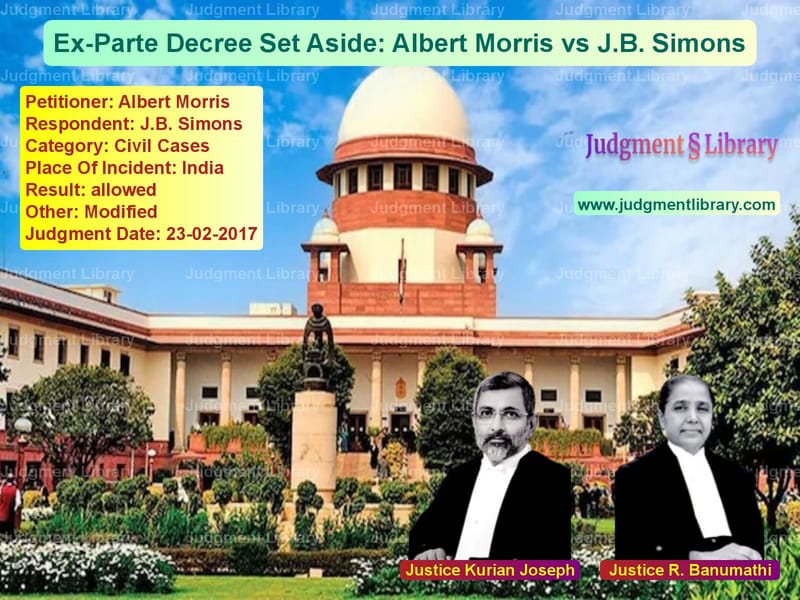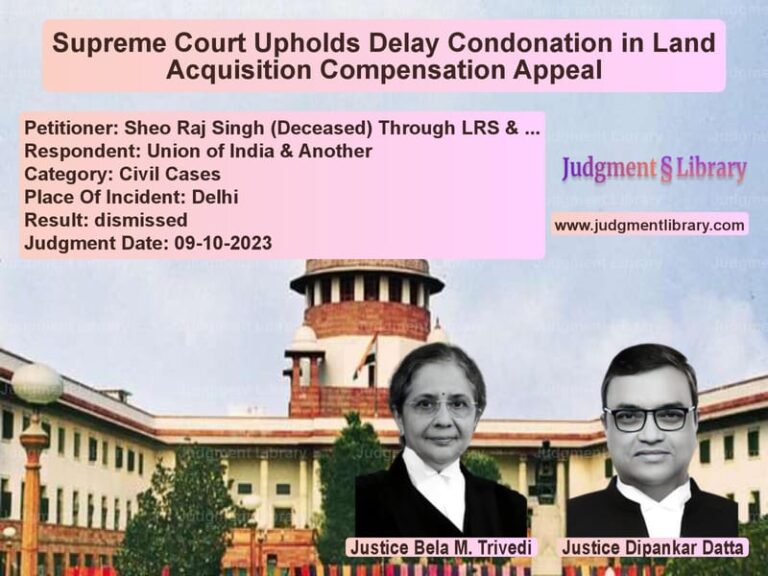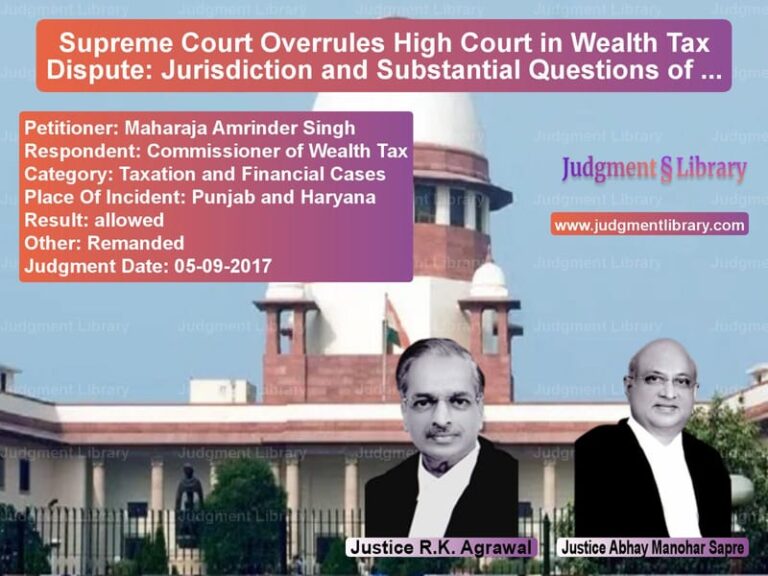Ex-Parte Decree Set Aside: Albert Morris vs J.B. Simons
The case of Albert Morris vs J.B. Simons revolves around a legal dispute where the appellant sought relief under Order IX Rule 13 of the Code of Civil Procedure (CPC). The Supreme Court had to determine whether the lower courts had erred in rejecting the appellant’s application for setting aside an ex-parte decree.
Background of the Case
The appellant, Albert Morris, had been set ex-parte for failing to file a written statement in response to a suit for recovery of money filed by the respondent, J.B. Simons. Subsequently, the appellant moved an application under Order IX Rule 13 CPC, seeking to have the ex-parte decree set aside. However, both the Trial Court and the High Court rejected this application, citing procedural lapses.
The primary reasons for dismissal were:
- The appellant did not file the written statement along with the application for condonation of delay.
- There was no formal application for condonation of delay in filing the application under Order IX Rule 13 CPC.
Aggrieved by these findings, the appellant approached the Supreme Court, arguing that the courts had not exercised judicial discretion fairly.
Key Legal Issues
- Whether the lower courts erred in rejecting the appellant’s application under Order IX Rule 13 CPC.
- Whether procedural lapses should have prevented the appellant from obtaining relief.
- Whether the principles of equity and fairness required the appellant to be given an opportunity to contest the case on merits.
Arguments by the Petitioner (Albert Morris)
- The appellant contended that the lower courts had unfairly denied him an opportunity to present his defense.
- He argued that the same leniency shown to the respondent (who was granted time to pay balance court fees) should have been extended to him.
- The appellant asserted that since this was a suit for money recovery, justice required that the matter be decided on merits rather than technical procedural grounds.
Arguments by the Respondent (J.B. Simons)
- The respondent maintained that the appellant had been negligent in defending the suit.
- He argued that the appellant’s failure to comply with procedural requirements justified the rejection of the application.
- The respondent emphasized that procedural rules exist to ensure fairness, and exceptions should not be made lightly.
Supreme Court’s Observations
The Supreme Court critically examined the case and found that the lower courts had not exercised discretion appropriately. The Court noted:
“It is seen from the records that after the appellant was set ex-parte for not filing the written statement, the respondent herein (the plaintiff) was granted time to pay the balance Court Fee and for ex-parte evidence.”
The Court further observed:
“In our view, when the plaintiff could be shown the indulgence, the same equity should have been meted out to the appellant (defendant). After all, this is a suit for recovery of money and in our view, the Court should have put the parties at least to terms and then disposed of the matter on merits expeditiously.”
The Court acknowledged that while procedural rules must be followed, justice should not be denied on technical grounds.
Final Judgment by the Supreme Court
The Supreme Court ruled:
- The orders of the High Court and the Trial Court were set aside.
- The application under Order IX Rule 13 CPC was allowed.
- The appellant was directed to file his written statement within two weeks from the date of the order.
- If the appellant failed to file the written statement within the stipulated time, the dismissal order passed by the Trial Court would stand affirmed.
- The appellant was directed to pay costs of Rs. 25,000 to the respondent before filing the written statement.
The Supreme Court concluded:
“Having regard to the background of the case, we direct the appellant to pay costs of Rs. 25,000/- to the respondent. The costs shall be paid before filing of the written statement.”
Analysis of the Judgment
This case highlights critical legal principles regarding ex-parte decrees and procedural fairness:
- Equity and Fairness: The Court emphasized that both parties should be treated equitably, especially in money recovery suits.
- Judicial Discretion: The ruling underscores that courts should exercise discretion judiciously and avoid mechanical application of procedural rules.
- Balancing Procedural Compliance and Substantive Justice: While procedural rules are important, they should not result in injustice.
Conclusion
The ruling in Albert Morris vs J.B. Simons reinforces the principle that procedural technicalities should not override the need for fair adjudication. By setting aside the ex-parte decree and allowing the appellant to file a defense, the Supreme Court ensured that justice was served in accordance with the principles of equity and fairness.
This case serves as an important precedent for future disputes involving ex-parte decrees and highlights the need for courts to maintain a balance between procedural compliance and substantive justice.
Don’t miss out on the full details! Download the complete judgment in PDF format below and gain valuable insights instantly!
Download Judgment: Albert Morris vs J.B. Simons Supreme Court of India Judgment Dated 23-02-2017.pdf
Direct Downlaod Judgment: Direct downlaod this Judgment
See all petitions in Contract Disputes
See all petitions in Debt Recovery
See all petitions in Specific Performance
See all petitions in Judgment by Kurian Joseph
See all petitions in Judgment by R. Banumathi
See all petitions in allowed
See all petitions in Modified
See all petitions in supreme court of India judgments February 2017
See all petitions in 2017 judgments
See all posts in Civil Cases Category
See all allowed petitions in Civil Cases Category
See all Dismissed petitions in Civil Cases Category
See all partially allowed petitions in Civil Cases Category







